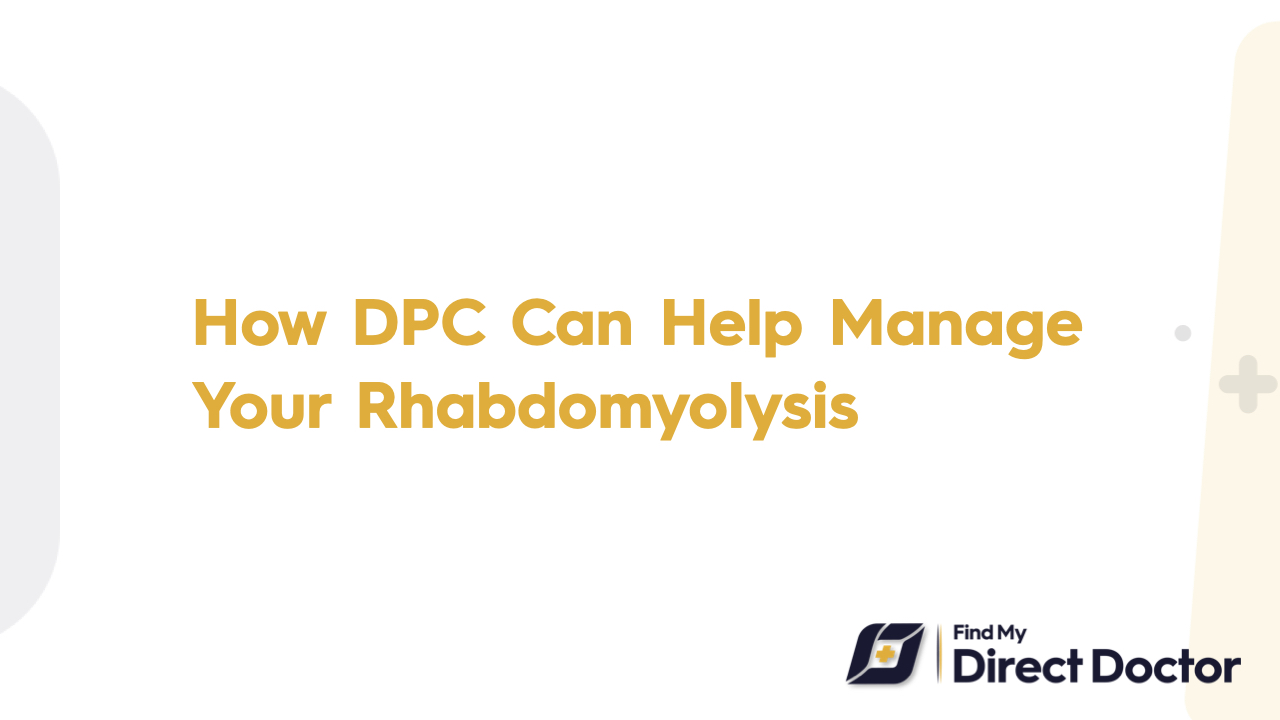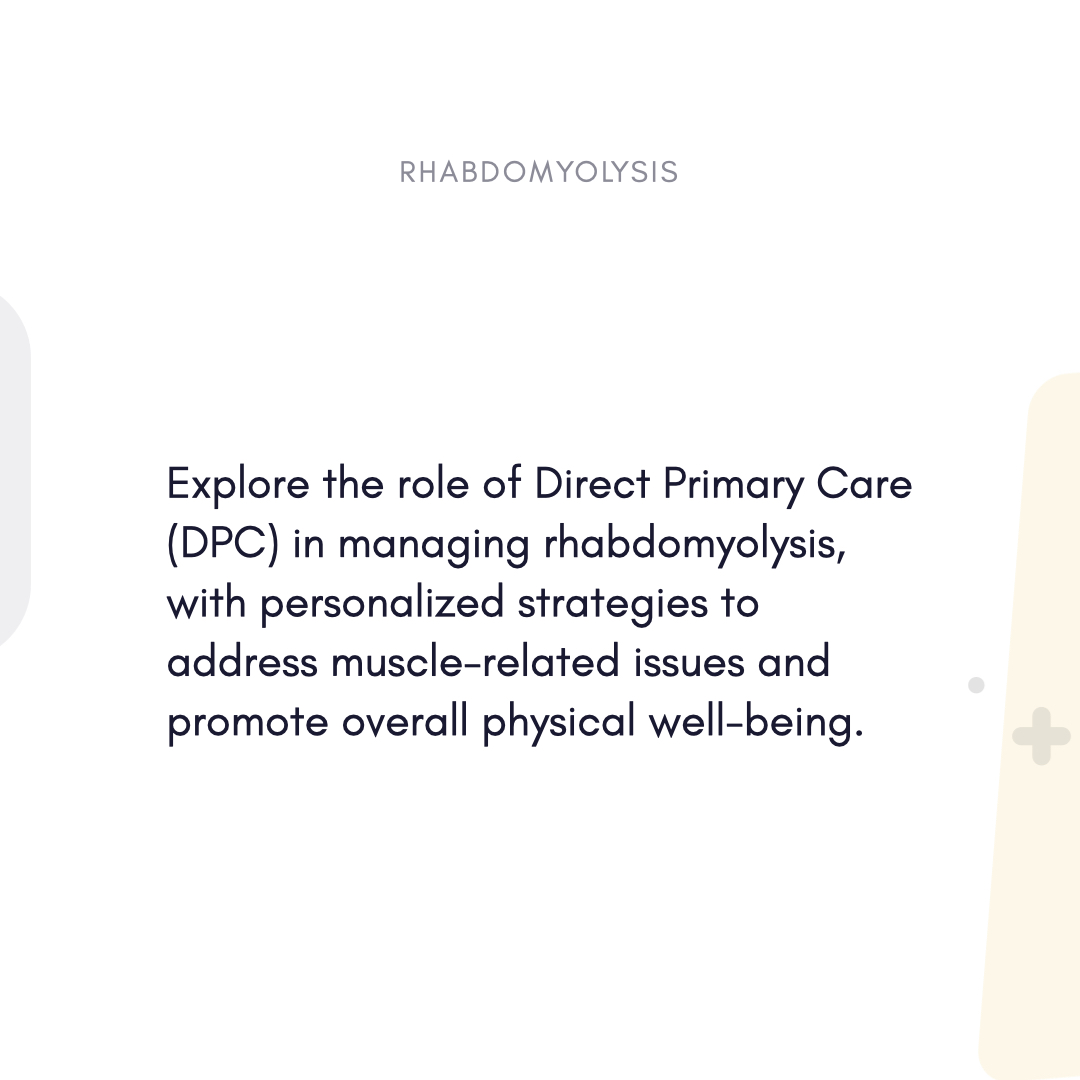Rhabdomyolysis and Direct Primary Care (DPC): Rapid Intervention to Protect Your Kidneys
Dark pee following a hard workout. Muscle pain so severe you are unable to move. If untreated, this muscle breakdown crisis risks kidney failure for 26,000 Americans with rhabdomyolysis yearly. Although traditional treatment sometimes entails expensive ER visits, Direct Primary Care (DPC) offers quick, professional treatment to eliminate toxins and protect your health.

Realizing Rhabdomyolysis
When damaged muscle tissue leaks myoglobin into the bloodstream, rhabdomyolysis results from:
- Muscle soreness or swelling
- Urine with dark cola color (myoglobinuria)
- Greater than 5,000 U/L CK levels
Typical triggers include:
- Extreme physical activity ("crush injury")
- Medications including statins, antipsychotics, or illegal narcotics
- Heatstroke, illnesses, metabolic problems
Treatments for untreated risks Acute kidney injury (AKI), cardiac arrest, death To avoid renal failure, the National Kidney Foundation advises vigorous IV hydration over six hours.
DPC Changes: Rhabdomyolysis Maintenance
Operating on a membership model usually ranging from 100 USD to 200 USD per month, Direct Primary Care (DPC) provides unlimited access to your doctor for a set fee. This translates for rhabdo patients into no co-pays, no ER delays, and a treatment plan as critical as your symptoms.
1. Right Diagnosis and Treatment Right away
The transparent approach of DPC guarantees:
- CK testing same-day from in-office labs.
- On-site lactated Ringer's infusions form IV hydration suites.
- Correcting hyperkalemia with calcium gluconate addresses electrolyte control.
2. Customized, Protocol-driven Treatment
DPC doctors design customized plans compliant with nephrology recommendations:
- Mild cases: sodium bicarbonate + oral hydration + urine alkalinization.
- Severe cases: For AKI risk, continuous IV fluids plus ICU coordination.
- Changing statins and heat disease prevention strategies helps to reduce triggers.
3. All-encompassing, reasonably priced assistance
DPC lowers medical and financial risk by:
- IV fluids at 50 USD instead of 500 USD ER cost slashing power.
- Monitoring urine output and CK trends makes 24/7 telehealth access possible.
- Preventive education: athlete hydration plans, genetic testing for those who are prone.
DPC's advantages for rhabdo patients
1. Unmatched Accessibleibility
- 24/7 consultations for dark urine or sudden muscular pain.
- For CK tests or specialist referrals, no prior authorization delays.
2. Individualized Interventions
- Athletes: CK baseline rehydration rules and tracking system.
- Users of statins: coQ10 supplements help to lower myopathy risk.
3. Open Pricing: Affordability
- Membership covers labs, consultations, IV treatments—no hidden fees.
- Typical savings from avoiding ER visits and hospital admissions: 3,000 USD+.
Personal Success Stories from Real Life
- Case 1: 25-year-old Jake developed rhabdo following a marathon. Same-day 4L IV fluids from his DPC doctor prevented AKI.
- Case 2: Maria, 60, on high-dose statins, had CK checked monthly using DPC. Early discovery let statin be changed before rhabdo started.
Common Questions: DPC and Rhabdomyolysis
- Q: Can DPC manage dialysis-requiring AKI?
- A: Sure. DPC coordinates dialysis access and emergent nephrology consultations.
- Q: Is DPC within reach for those without insurance?
- A: Certainly. Members cut on IV fluids and steer clear of 10,000 USD+ hospital charges.
- Q: What about hereditary conditions like McArdle's?
- A: A DPC creates custom exercise programs and genetic tests to stop episodes.
Why DPC Wins for Rhabdo Patients?
Emphasizing DPC's alignment with rhabdo rules, the American Society of Nephrology supports:
- Speed: IV fluids inside the golden six-hour window.
- Precision: Customizing liquids to CK levels and coexistence.
- Trust: A vigilant partner replaces inconsistent, delayed treatment.
Act Quickly to Save Your Kidneys
Rhabdomyolysis need not bring about catastrophe. Every drop of IV fluid counts as DPC helps you to find a partner who treats aggressively, acts fast, and walks with you from crisis to recovery.






